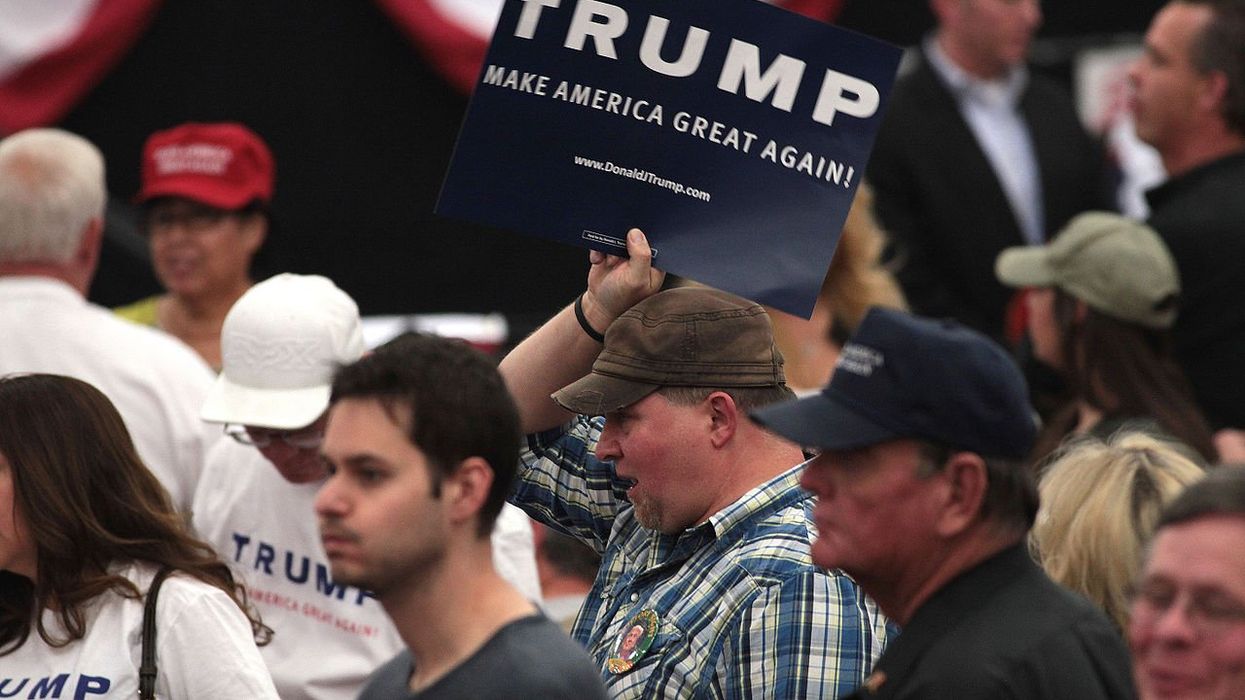
Donald Trump supporters in 2016 (Creative Commons)
Alex Henderson
February 27, 2024
Despite being a native New Yorker who was born and raised in Queens and later studied business at the University of Pennsylvania in Philadelphia, 2024 GOP presidential frontrunner Donald Trump's strongest support has come from white rural Americans. Trump struggles with urban and suburban voters, but his popularity among white rural voters and evangelical Christian fundamentalists has not dwindled — even as he faces four criminal indictments.
Trump has gone out of his way to feed his base's anger, declaring "I am your retribution" — a thirst for "retribution" that, according to Never Trump conservative and former Republican National Committee (RNC) Chairman Michael Steele, former South Carolina Gov. Nikki Haley doesn't satisfy.
Liberal economist and New York Times columnist Paul Krugman examines the causes of "white rural rage" in his February 26 column, citing "technology" as a key factor in driving "the MAGA narrative."
READ MORE:Former RNC chair explains why Nikki Haley doesn’t fill MAGA Republicans' thirst for 'retribution'
"Technology eliminates some jobs," Krugman explains, "but it has always generated enough new jobs to offset these losses, and there's every reason to believe that it will continue to do so for the foreseeable future. But progress isn't painless."
Krugman observes that although technology "has made America as a whole richer," it has created a lot more high-paying jobs in urban and suburban areas than it has in rural areas — where it has "reduced economic opportunities," creating "hardship" and a "loss of dignity."
"Maybe that loss of dignity explains both white rural rage and why that rage is so misdirected — why it's pretty clear that this November, a majority of rural white Americans will again vote against Joe Biden, who as president, has been trying to bring jobs to their communities, and for Donald Trump, a huckster from Queens who offers little other than validation for their resentment," Krugman argues. "This feeling of a loss of dignity may be worsened because some rural Americans have long seen themselves as more industrious, more patriotic and maybe even morally superior to the denizens of big cities — an attitude still expressed in cultural artifacts like Jason Aldean’s hit song 'Try That in a Small Town.'"
Krugman continues, "In the crudest sense, rural and small-town America is supposed to be filled with hard-working people who adhere to traditional values, not like those degenerate urbanites on welfare, but the economic and social reality doesn't match this self-image…. It helps explain why the MAGA narrative casts relatively safe cities like New York as crime-ridden hellscapes while rural America is the victim not of technology but of illegal immigrants, wokeness and the deep state."
READ MORE: 'Right-wing psychos': Inside Trump's plan to 'infuse Christian nationalist ideas' in his 2.0 agenda
Paul Krugman's full New York Times column is available at this link (subscription required).
Despite being a native New Yorker who was born and raised in Queens and later studied business at the University of Pennsylvania in Philadelphia, 2024 GOP presidential frontrunner Donald Trump's strongest support has come from white rural Americans. Trump struggles with urban and suburban voters, but his popularity among white rural voters and evangelical Christian fundamentalists has not dwindled — even as he faces four criminal indictments.
Trump has gone out of his way to feed his base's anger, declaring "I am your retribution" — a thirst for "retribution" that, according to Never Trump conservative and former Republican National Committee (RNC) Chairman Michael Steele, former South Carolina Gov. Nikki Haley doesn't satisfy.
Liberal economist and New York Times columnist Paul Krugman examines the causes of "white rural rage" in his February 26 column, citing "technology" as a key factor in driving "the MAGA narrative."
READ MORE:Former RNC chair explains why Nikki Haley doesn’t fill MAGA Republicans' thirst for 'retribution'
"Technology eliminates some jobs," Krugman explains, "but it has always generated enough new jobs to offset these losses, and there's every reason to believe that it will continue to do so for the foreseeable future. But progress isn't painless."
Krugman observes that although technology "has made America as a whole richer," it has created a lot more high-paying jobs in urban and suburban areas than it has in rural areas — where it has "reduced economic opportunities," creating "hardship" and a "loss of dignity."
"Maybe that loss of dignity explains both white rural rage and why that rage is so misdirected — why it's pretty clear that this November, a majority of rural white Americans will again vote against Joe Biden, who as president, has been trying to bring jobs to their communities, and for Donald Trump, a huckster from Queens who offers little other than validation for their resentment," Krugman argues. "This feeling of a loss of dignity may be worsened because some rural Americans have long seen themselves as more industrious, more patriotic and maybe even morally superior to the denizens of big cities — an attitude still expressed in cultural artifacts like Jason Aldean’s hit song 'Try That in a Small Town.'"
Krugman continues, "In the crudest sense, rural and small-town America is supposed to be filled with hard-working people who adhere to traditional values, not like those degenerate urbanites on welfare, but the economic and social reality doesn't match this self-image…. It helps explain why the MAGA narrative casts relatively safe cities like New York as crime-ridden hellscapes while rural America is the victim not of technology but of illegal immigrants, wokeness and the deep state."
READ MORE: 'Right-wing psychos': Inside Trump's plan to 'infuse Christian nationalist ideas' in his 2.0 agenda
Paul Krugman's full New York Times column is available at this link (subscription required).
No comments:
Post a Comment